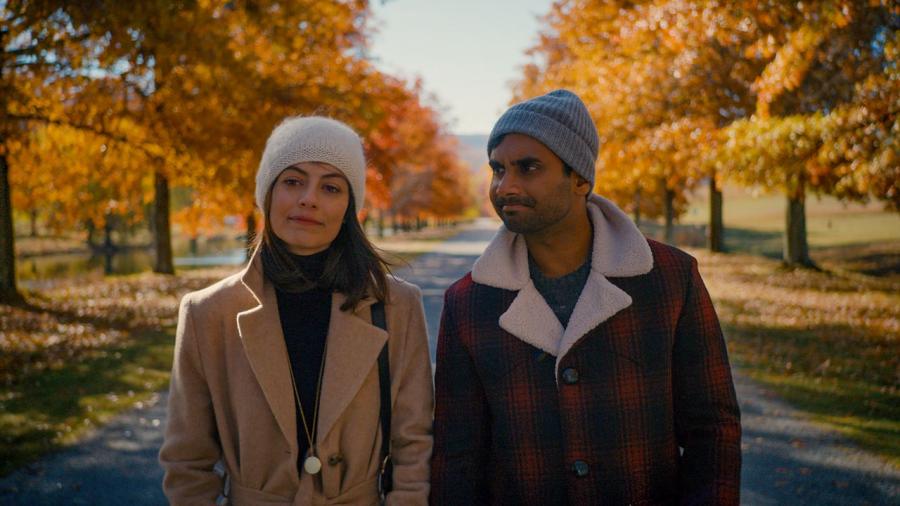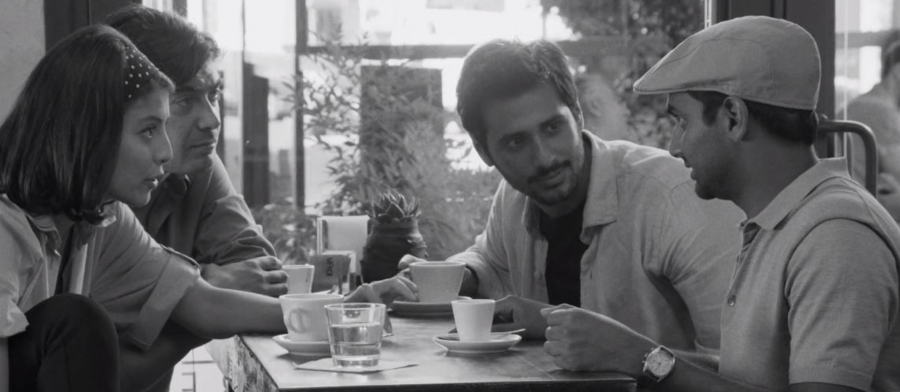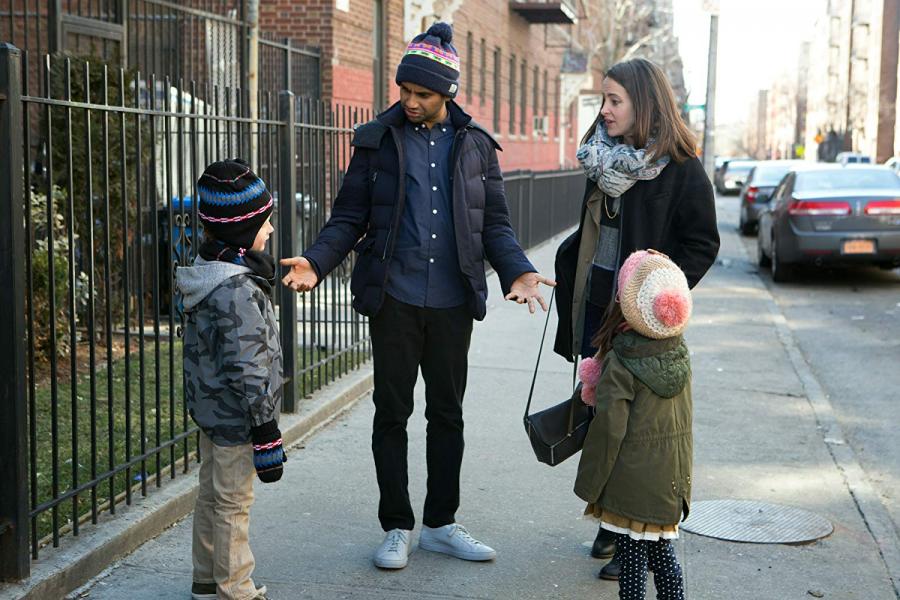
Master of None and Modern Romances on Television
Contemporary television has seen drastic changes in the construction of narratives for audiences to follow. In this article, I will be focusing on a modern romantic comedy series to showcase how it subverts common conventions of its genre, ascribing to what has been described by Jason Mittell (2006) as "narrative complexity".
Noticing the growing popularity of video streaming services, more and more writers and producers of television are captializing on this ever-expanding market through creating multiple series across a variety of genres. This contributes to a certain fluidity in terms of genre. Amidst the extensive library of television series on platforms like Netflix, Prime Video, and Disney+, Master of None, a romantic-comedy series created by Aziz Ansari and Alan Yang, stands out. In what follows, we will delve into the series' brilliance by utilizing the framework of narrative complexity (Mittell, 2006).
First encounter and Master of None
Let us rewind back to May 2017, when I was still an undergraduate student who considered my love life almost as dramatic as Werther’s in The Sorrows of Young Werther. It started with a horrible date night where everything that could go wrong had gone wrong: conversations were as dry as the Atacama Desert; the distance between us, both literally and figuratively, was as far as Earth is from the Moon; eye contact was nowhere to be found. After such a disastrous evening, all I could think of when I got home was that I should watch some Netflix series, abandoning the dating game and lying on the couch like a corpse. Little did I know my eyes would be glued to the screen for the next 11 hours, for that was the very night that I discovered Master of None.
In a similar vein to semi-autobiographical shows like Louie (2010-2015) and Better Things (2016- ), Master of None follows Dev Shah, played by Ansari himself, as he treads through the jungle of modern society. The story arc in Season 1 mainly focuses on Dev’s life as an actor in New York and later on his relationship with Rachel, a music publicist, while Season 2 heavily revolves around the will-they-won’t-they between Dev and Francesca, whom he meets during his pasta-making internship in Modena, Italy. The series has been nominated for several awards, including a Golden Globe for Best Actor in a Television Series in the Musical or Comedy category (which it won) and two Primetime Emmy Awards for Outstanding Writing in a Comedy Series.
The series has mostly owed its success to its capability to strike a chord with mass audiences by truthfully painting a picture of life as we know it. No matter if the series deals with the ups and downs of a romantic relationship or with experiences with sexism and racism, instead of it preaching on what is right or wrong, the audience are able to look at common occurrences that everyone can relate to through the lens of lovers, different genders or ethnic minorities.
Master of None blatantly dismisses the necessity for a positive resolution.
The award-winning series is also a perfect demonstration of the affordances of narratively complex television, which according to Jason Mittell (2006), is sparked by a rejection of conventional television. It is essentially “a redefinition of episodic forms under the influence of serial narration” (p.32). In addition, rather than CGI effects, it presents narrative special effects, which is the creative narrative techniques used to achieve “narrative spectacles”. One can think of Frank Underwood’s constant breaking of the fourth wall in House of Cards as an example of these. In my opinion, Master of None fits under the framework of narrative complexity due to its defiance of rom-com conventions, its creative juggling between episodic and serialized television, and the application of various narrative special effects.
Breaking the rom-com mold
In the digital age where everyone is connected yet as alone as ever, there seems to be an overflow of expendable romantic comedies which aim to numb urbanites’ anxiety of finding someone whom they feel connected to. These fairy tales usually are more optimistic. Instead of drawing a realistic picture, they often end on a happy note where the main characters set aside the dilemmas realizing their affection for each other triumphs over everything. In contrast, Master of None blatantly dismisses the necessity for a positive resolution.
“Finale”
In the series' episode titled “Finale”, which is also the season 1 finale, after attending a dreamlike wedding, Dev begins to have doubts about his relationship with Rachel. Seeing two people sharing vows on the altar with absolute certainty that they want to spend the rest of their lives with each other, he cannot help but wonder whether he and Rachel are 100% committed to one another, and whether there is any point in staying together if this is not the case? “Perhaps there are other paths than settling down?” he wonders. Eventually, the bubble of indecision bursts. The two end their relationship as Rachel moves to Tokyo to follow her lifelong dream.
Judging from the plot so far, it is rather clear that the series is attempting to steer away from the romantic comedy tradition. However, instead of concluding the episode here, it continues its momentum and even attmepts to manipulate audiences' expectations. The last scene shows Dev sitting next to an Asian lady on a flight to somewhere, presumably to Japan to win back Rachel. Then the series slaps us awake to its nature when Dev starts chatting with the lady, revealing that he is actually travelling to Italy to learn how to make pasta.

“Buona Notte”
Another illustration of the series' refusal to follow established conventions comes in “Buona Notte”, the final episode of the second season. Following Dev confessing his love to Francesca on a helicopter ride in the previous episode, the duo struggles with the decision of whether they should be together. Dev is more than excited with the possibility of being with Francesca, yet she reminds him that it is unrealistic for her to abandon her fiancé and life in Modena. Frustrated as Dev is, he begins accusing her of using him as an escape from a dying relationship. Standing between a rock and a hard place, after Francesca once again urges him to understand her conundrum, she leaves his apartment.
The scene later cuts to Dev chatting with his buddy Arnold at a bar, with the latter encouraging him to contemplate the reality of the situation. Considering the plot so far, one’s prediction would either be that Francesca moves to New York to start her relationship with Dev, or that she goes back to Italy and gets married. The series does not offer us an obvious resolution, however, as the final scene of the episode presents the couple in question staring blankly at each other in bed, without any words that can confirm or deny our speculations.
As evident from the episodes described above, Master of None is not interested in offering immediate satisfaction but invites us to ponder what happens after the “happily-ever-after”. Will Dev and Rachel be content with one another knowing they cannot pursue their dreams? Will Dev and Francesca live as happily as they did during the month they spent together, or are there compromises that have to be made and battles that have to be fought, like in a realistic relationship?
Balancing between the episodic and the serialized
Does anyone recall the seventh episode in the second season of Stranger Things titled “The Lost Sister”? The episode sets aside the main plot to take us on a trip to Chicago, Illinois with the star Eleven and guest star Kali, a girl who has undergone similar experiments conducted by Brenner. While the episode is a bold attempt at the more self-contained episodic form of television, it has received mixed reviews (rated 6.1 by users on IMDb).
The polarized response speaks to the difficulty of finding balance in the episodic-serialized spectrum considering that writers as talented as the Duffer Brothers could not consistently pull it off. Nevertheless, Master of None has achieved such balance masterfully. In my opinion, the two major reasons for the series’ success in the department are the strategic positioning of these standalone episodes, and the fact that they are still relevant to the themes of the series. In the case of Stranger Things, audiences had to hit the pause button on the main plot, which was starting to get interesting as the previous episode ended on a cliffhanger with the Demogorgons about to attack the Hawkins Lab. The sudden shift to Chicago in “The Lost Sister” does not make sense since all that viewers are interested in after the preceding episode is to find out what happens in the main storyline. On the other hand, let’s examine two of the more independent episodes in Master of None, “The Thief” and “New York, I Love You”.
“The Thief”
In brief, "The Thief" is a modern version of The Bicycle Thief (1948), but instead of bicycles, it was Dev’s phone (which contained the number of a woman he just had a good time with) that was stolen. Aside from the deliberate choice of paying homage to the Italian neorealist drama, the positioning of the episode is interesting as well. As the first episode of the second season, it is almost as if the creators of the series are using it as a short prior to the screening of a film. The standalone episode foregrounds the central theme and tone of the main attraction. On top of that, it does not deviate from the central focus of season 2, which is Dev’s struggle to find a connection in the vast universe.

“New York, I Love You”
To provide context for the placement of this episode, I would like to summarize the previous episode first. Dev and Francesca attend a dinner party hosted by Jeff Pastore, a renowned food show host. The two enjoy delicious cuisine, melodious music, and interesting conversations at the party. On the Uber home, after reading a text from Francesca, who is leaving New York, Dev finally realizes that he has feelings towards her. The camera then stays on the lovestruck Dev as he goes through a roller coaster of emotions while sitting in the Uber's backseat alone. The screen eventually fades to black as the viewers are also seemingly caught in this whirlwind of emotions.
Master of None is not interested in offering immediate satisfaction but invites us to ponder what happens after the “happily-ever-after”.
As the follow-up to such a heart-wrenching episode, “New York, I Love You” shifts its focus from the main characters to the everyday lives of New Yorkers. Specifically, it follows the lives of a doorman, a deaf woman, and a taxi driver. While one might argue the episode is also following a cliffhanger from the last episode, i.e., whether Dev’s affection towards the charming Francesca will bear fruit, the episode is not as intrusive as Stranger Things’ “The Lost Sister” since the main storyline comes to an organic stop when Francesca goes back to Italy. Moreover, after experiencing the frustration with Dev, the light-hearted episode could be considered a welcomed distraction. What is also noteworthy is that the episode’s focus on everyday, common people ties back to Italian neorealism’s concern with the circumstances of everyday lives, which is, as mentioned above, an essential theme of the second season.
Narrative special effects
In the modern age of television, screenwriters often sense the necessity to distinguish themselves from series in similar genres. Due to such necessity, it has become more common to utilize an arsenal of narrative techniques such as flashbacks/flashforwards, dream sequences, and breaking the fourth wall. Through these methods, the screenwriters generate a sense of operational aesthetics for the viewers to embrace, through which the pleasure is more about “how did he do that?” instead of “what will happen?” (Harris, 1981). One can think of Bojack Horseman’s “Fish out of Water”, Modern Family’s “Connection Lost”, or Community’s “Remedial Chaos Theory” as recent examples of episodes along these lines. Interestingly, several episodes in Master of None share such a desire to stand out from the pack as well.
“Plan B”
As is already suggested in the opening scene of this episode, in which Dev freaks out about the condom breaking while having intercourse with Rachel, the core issue of the episode is the question of “Should I settle down or keep dating?” While such topic is by no means uncharted territory in the rom-com genre, the episode delves into the dilemma in a rather unique manner compared to its peers within the genre. More precisely, traditional romantic comedies often deal with the question by following character arcs in which the protagonist has a chance encounter with “the one”; then, after a series of obstacles, the couple eventually settles down. Through this approach, what the audiences take away after viewing, more often than not, would be that keep dating solely serves as a means to an end, i.e., settling down.
However, to explore the subject more holistically, “Plan B” is arranged in a symmetrical structure. That is to say, we are shown the reality of one side first then the other. We watch as the settled-down father explains how wonderful it is to smile with a person whom he created. Following the father's heartwarming confession, the scene tranistions to a romanticized fantasy sequence in which Dev and his imagined children live happily together.
Then comes a brutal wave of reality, however, as Dev expriences hands-on what it is like to be a parent. As it turns out, it is not always sunshine and rainbows. Dev cannot try out the strawberry cheesecake flavor because the children forced him to have vanilla ice cream instead; he has to accompany his little girl in the bathroom because she is afraid of being in there alone; he has to pay for all the frozen waffles in the supermarket because his young boy has rubbed his genitals all over the packages. After all this mayhem, the audiences enter a bleak fantasy sequence scored with a heavy metal soundtrack in which Dev’s imagined children are causing chaos wherever they go. The final scene introduces a literal and metaphorical choice for Dev: he has to choose between a sandwich made by the stress-inducing children (settling down) or a delicious store-bought one (exploring what the world has to offer). Following the traumatic experience, he picks up the latter in a heartbeat.

“Ladies and Gentlemen”
Another instance of clever storytelling can be found in the episode “Ladies and Gentlemen”. As the title hints at, the episode is about the difference between being a man and being a woman in modern society. To investigate the discrepancy, the screenwriters place Dev and his friend Arnold at a bar. With the setting established, the camera subtly begins to interchange between their perspective and an unknown woman’s. While Dev and Arnold’s biggest problem at the bar is how to grasp the attention of the bartender, the unknown woman is being harassed by a drunk man. On their way home, Dev and his friend decide to cut through Central Park, which is considered rather dangerous at night, even for the most streetwise New Yorker. Still, their sense of ease in walking through the Park is conveyed through the soundtrack: Bobby McFerrin’s Don’t Worry Be Happy.
On the other hand, on her walk home, the unknown woman is extremely aware of her surroundings. Unsure if she is being followed, she even takes out her phone and preemptively dials in "91", leaving out the last 1 so she can reach the emergency service number faster if anything goes south. To make the sequence look even more like the premise of a horror film, it is accompanied by a suspenseful soundtrack. Next, the camera cuts back to Dev as we witness the greatest “catastrophe” he has faced yet, i.e., stepping on dog feces and ruining his favorite sneakers. What the unknown woman has to deal with in contrast, is the drunk man at the bar, who has apparently followed her home.
Aside from the fact that traditional television, such as Leave it to Beaver, rarely (if at all) investiages such subjects, it often aims at depicting women in stereotypical and outdated roles. By telling the story of an ordinary night out from two different perspectives, Ansari and Yang produce the “Rashomon effect”, named after the iconic Akira Kurosawa film. Through this effect, one is able to observe the differences between different points of view and acquire a bigger picture of what it means to be a man or a woman nowadays.
Master of None , romance and narrative complexity
At its core, Master of None comprises Aziz Ansari's acute observations about romance and society, translated onto our screens of choice. Although investigating the peculiarity of modern romances is the stand-up comedian’s chief consideration, being a contemporary intellectual, Ansari also offers captivating insights into societal issues like racism and sexism. That being said, it is important to acknowledge that the translation of his ingenious understandings into the television series would not have been successful without him working under the architecture of narrative complexity. Through rejecting romantic comedy traditions, experimenting with the balance between standalone episodes and on-going story arcs, and applying a variety of narrative special effects, the series is capable of constantly surprising us while remaining digestible: it toys with our expectations yet at the same time arranges the narrative techniques and structure in a comprehensible manner. The final product is a work that not only resonates with its audiences but provides a breath of fresh air to the current comedy series landscape.
References
Harris, N. (1973). Humbug: The Art of P. T. Barnum. Chicago, IL: University of Chicago Press.
Mittell, J. (2006). Narrative Complexity in Contemporary American Television. The Velvet Light Trap, 58 (1), 29-40. doi: 10.1353/vlt.2006.0032